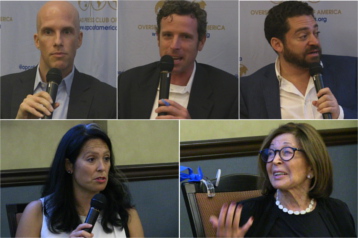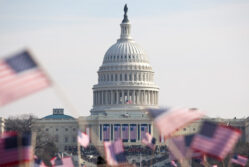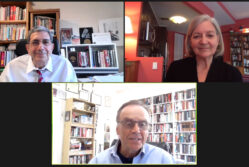Event Coverage Highlight

Panelists Discuss the Future of International Sports

Clockwise from top left: Grant Wahl, Sean Gregory, Josh Fine, Jacqueline Albert-Simon and Lindsay Krasnoff.
By Chad Bouchard
In the wake of last year’s shakeup at the Fédération Internationale de Football Association, as well as more recent scandals following this summer’s Olympics in Rio, sports observers are taking a hard look at the future of large international sporting events.
On Wednesday, Sept. 14, the OPC hosted a discussion with four reporters and experts who study sports. Panelists talked about a range of topics, including the future of women’s soccer, FIFA’s new leadership and criticisms of the International Olympic Committee.
Grant Wahl, a senior writer for Sports Illustrated and a correspondent for FOX Sports, said an ongoing legal dispute between the U.S. Soccer Federation and U.S. women players over pay inequality could make reverberate to other across the globe.
“I think it’s going to set a standard for how women soccer players in other countries fight for their own recognition and investment by their own federations, which is pretty shamefully low in several other countries.”
US men soccer players received $9 million for a poor performance in the most recent World Cup, Wahl said, while US women received around $2 million for winning the World Cup last year with fan viewing at an all-time high for their games.
He said talks between players are likely to heat up in October and could result in a strike on January 1 next year.
Sean Gregory, a senior writer at TIME magazine who covered the Rio Olympics, said the number of bids from cities to host the games is declining.
“We’re seeing in the summer [games] yet world class cities saying ‘we don’t want this,’ but we’ve seen it in the winter [games] – are we going to start seeing it for the summer? Where is this thing going in the next few decades as the costs of the Olympics are more transparent and apparent?”
Rio, which bid to host the summer games seven years ago, has since suffered from economic problems, and took an estimated loss of about $50 million, while construction to get ready for the games did little to benefit the country’s poor and displaced 4,200 families, he said.
Josh Fine, a producer at Real Sports with Bryant Gumbel at HBO, played an abbreviated version of a special that examined the IOC, its relationship to host countries, and a “seeming preference for working with authoritarian regimes who seem perhaps all too happy to get the international legitimacy that comes with hosting the games and don’t give the IOC a particularly hard time about any of their demands.”
Lindsay Krasnoff, historian, writer and author of The Making of Les Bleus: Sport in France, 1958-2010, said while recent doping scandals have marred the event’s reputation, use of forbidden substances to enhance performance is far from new.
“The first documented case of doping at the Olympics was in 1904 with an American runner who was given a combination of egg whites, strychnine and brandy by his doctor in order to get him hopped up enough to finish the race.”
Krasnoff said while individual pressure to perform is high, it’s also critical to look at root causes and institutions that turn a blind eye.
An independent commission reported in July that Russia had operated a state-sponsored doping program during the 2014 Sochi Winter Games, sparking calls for a blanket ban on Russian athletes in Rio.
She said the Olympics have long been a way for developing countries to prove themselves on the world stage, and for geopolitical rivals to demonstrate prowess.
“Sports was an arena in which [countries] could win, could gain some degrees of influence and perhaps to influence how other countries adapted their sports programs or looked to them for cultural cues and innovations.”
She cited France’s decision to focus on developing “cerebral” sports like fencing and basketball to assert the country’s identity and demonstrate intellectual mastery.
Krasnoff and longtime OPC member and former governor, Jacqueline Albert-Simon, co-hosted the panel.
Please browse our playlist of video clips in the window below from the panel, including a recording of the entire event.



